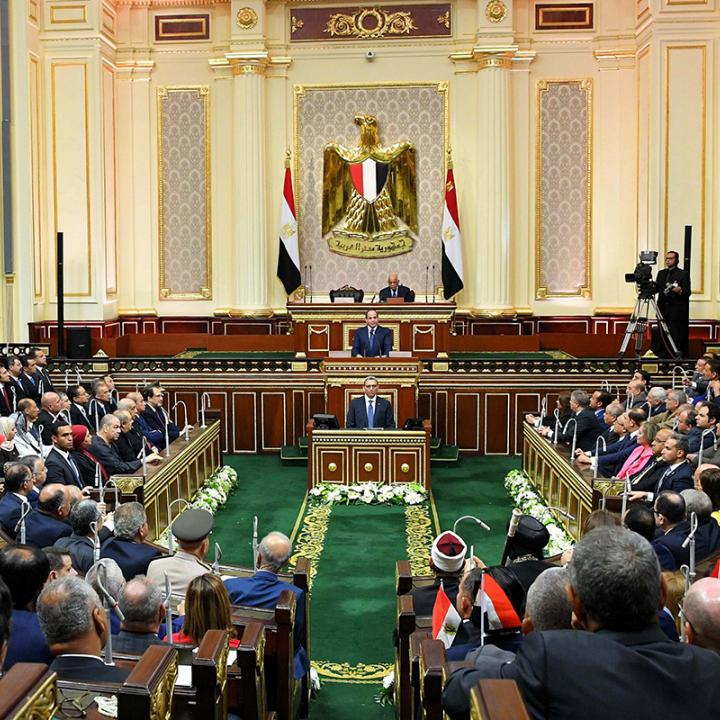
- Policy Analysis
- Policy Alert
Egypt’s New Parliament: Reopening Political Life, But Only So Far

Giving the legislature a makeover is Cairo’s latest bid to ease public frustrations, but will a token opposition be enough to keep socioeconomic tensions from boiling over?
When the newly elected Egyptian parliament held its inaugural session on January 12, changes could be seen all across the board. Farida al-Shobashi became the country’s first woman to chair the opening session of an incoming legislature. The Free Egyptians Party, founded by liberal business tycoon Naguib Sawiris after the 2011 uprisings, was totally absent. Copts lost seats (down from 36 to 27 members), as did Salafi Muslims (their al-Nour Party dropped from 11 to 7 seats) and independent members (who plummeted from 325 to 92). In contrast, the pro-government Nation’s Future Party gained a majority by rocketing from 52 members to 316 in the 596-seat parliament. Overall, 200 incumbents lost their seats, 176 kept theirs, and 209 did not run.
Among the most notable individuals to be replaced was Ali Abdel Aal, the unpopular speaker of parliament who did not run for reelection. He has been succeeded by Hanafi al-Gebali, a former judge who famously ruled in favor of handing the islands of Tiran and Sanafir over to Saudi Arabia, defying domestic public opinion. Well-known pro-government legislators Abdel Rahim Ali and Mortada Mansour also unexpectedly lost their seats. Several factors help explain all these changes in Cairo.
Sisi’s Willingness to Give Political Life a Chance
President Abdul Fattah al-Sisi’s government is apparently trying to nurture some semblance of political life in order to contain public frustration over Egypt’s formidable economic and social problems. Specifically, officials sought to decrease the number of independent members in parliament and increase the tally of party affiliates.
This move likely stemmed from the fact that many independents in the previous parliament did not have strong voices in their districts because they lacked the power to offer public services, organize town halls, or hand government contracts and jobs to their patrons. Some of them became visibly unenthused about serving in parliament and routinely skipped sessions. Such neglect spurred former parliamentarian Mohamed Anwar Sadat to speak out last August, when he called for releasing the names of members who “haven’t said a word” to show the public who works for them.
Sisi also seems to have realized that media activity is not enough to fill Egypt’s emptied political space. After overthrowing the Muslim Brotherhood-led government of Mohamed Morsi in 2013 and muzzling the political opposition, Sisi’s circle put heavy pressure on all media organizations and coopted many of them into propaganda outlets (e.g., using them to highlight major infrastructure projects that cast Cairo in a good light). Yet this approach did not have the desired effect, and in 2019, exiled government contractor Muhammad Ali succeeded in mobilizing people to the streets through his YouTube videos. Afterward, some government factions concluded that the lack of political parties was the reason for their unpopularity, even though the conventional wisdom in Cairo had long held that opening up political space could threaten their power.
Survival Through Turnover
Over the past six years, Sisi’s philosophy has been to rotate ministers and other key government personnel, partly to minimize popular anger against individual officials, but also to signal decisionmakers that anyone is replaceable. Unlike the previous era, Sisi’s rule is characterized by a lack of power centers outside the president’s close circles. Under former leader Hosni Mubarak, well-known ministers held their positions for decades, most notably former defense minister Muhammad Hussein Tantawi. This longevity eventually created sensitivities between the old guard and the new guard led by Gamal Mubarak—a situation that current officials believe made the elder Mubarak easier to depose.
Hence, Sisi and his circle tend to see any internal friction as a potential catalyst for raising the Muslim Brotherhood back from the dead and pushing the current leadership out the door. They have also made a habit of destroying alternative power centers. In 2017, Sisi placed limits on the authority of judges and pushed a law that gave him more influence on such matters despite massive opposition from the judiciary. He has also boldly fired key figures who helped him oust Morsi, including intelligence chief and longtime mentor Gen. Muhammad Farid al-Tuhami and Interior Minister Muhammad Ibrahim.
Policy Implications
The reshuffling of parliament confirms that the pro-government Nation’s Future faction is Egypt’s new ruling party. Sisi’s circle is presenting a democratic, pluralistic picture of this outcome, but in truth the legislature will be dominated by one major party surrounded by small parties that serve as window dressing, thereby mimicking an opposition just enough to occasionally channel the public’s frustration at socioeconomic conditions. This is straight from the Mubarak playbook.
Yet it remains to be seen how much tolerance the government will have for vigorous debates in parliament, and how far it will let this experiment go. At stake is the question of whether Sisi will be able to transcend Mubarak’s fate and, more important, help the country overcome its most pressing problems.
Haisam Hassanein is a Middle East analyst and a former Glazer Fellow with The Washington Institute.



